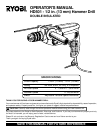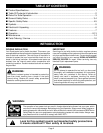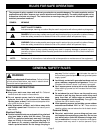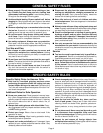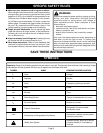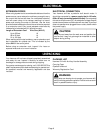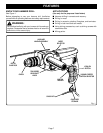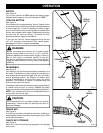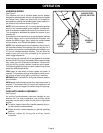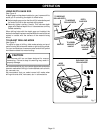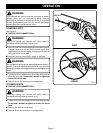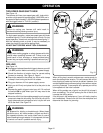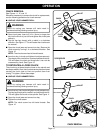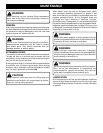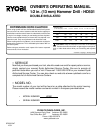
Page 4
■ Disconnect the plug from the power source before
making any adjustments, changing accessories, or
storing the tool. Such preventive safety measures
reduce risk of starting the tool accidentally.
■ Store idle tools out of reach of children and other
untrained persons. Tools are dangerous in the hands of
untrained users.
■ Maintain tools with care. Keep cutting tools sharp and
clean. Properly maintained tools with sharp cutting edges
are less likely to bind and are easier to control.
■ Check for misalignment or binding of moving parts,
breakage of parts, and any other condition that may
affect the tool's operation. If damaged, have the tool
serviced before using. Many accidents are caused by
poorly maintained tools.
■ Use only accessories that are recommended by the
manufacturer for your model. Accessories that may be
suitable for one tool, may become hazardous when used
on another tool.
Service
■ Tool service must be performed only by qualified re-
pair personnel. Service or maintenance performed by
unqualified personnel could result in a risk of injury.
■ When servicing a tool, use only identical replacement
parts. Follow instructions in the Maintenance section
of this manual. Use of unauthorized parts or failure to
follow Maintenance Instructions may create a risk of elec-
tric shock or injury.
GENERAL SAFETY RULES
■ Dress properly. Do not wear loose clothing or jew-
elry. Contain long hair. Keep your hair, clothing, and
gloves away from moving parts. Loose clothes, jewelry,
or long hair can be caught in moving parts.
■ Avoid accidental starting. Be sure switch is off before
plugging in. Carrying tools with your finger on the switch
or plugging in tools that have the switch on invites acci-
dents.
■ Remove adjusting keys or wrenches before turning
the tool on. A wrench or a key that is left attached to a
rotating part of the tool may result in personal injury.
■ Do not overreach. Keep proper footing and balance
at all times. Proper footing and balance enables better
control of the tool in unexpected situations.
■ Use safety equipment. Always wear eye protection.
Dust mask, non-skid safety shoes, hard hat, or hearing
protection must be used for appropriate conditions.
Tool Use and Care
■ Use clamps or other practical way to secure and
support the workpiece to a stable platform. Holding
the work by hand or against your body is unstable and
may lead to loss of control.
■ Do not force tool. Use the correct tool for your appli-
cation. The correct tool will do the job better and safer at
the rate for which it is designed.
■ Do not use tool if switch does not turn it on or off.
Any tool that cannot be controlled with the switch is
dangerous and must be repaired.
SPECIFIC SAFETY RULES
■ Check damaged parts. Before further use of the tool, a
guard or other part that is damaged should be carefully
checked to determine that it will operate properly and
perform its intended function. Check for alignment of
moving parts, binding of moving parts, breakage of parts,
mounting, and any other conditions that may affect its
operation. A guard or other part that is damaged should
be properly repaired or replaced by an authorized service
center. Following this rule will reduce the risk of electric
shock, fire, or serious injury.
■ Keep the tool and its handle dry, clean, and free
from oil and grease. Always use a clean cloth when
cleaning. Never use brake fluids, gasoline, petroleum-
based products, or any strong solvents to clean your
tool.
■ Do not abuse cord. Never carry tool by cord or yank
it to disconnect from receptacle. Keep cord from
heat, oil and sharp edges. Following this rule will reduce
the risk of electric shock or fire.
■ Inspect for and remove all foreign objects from
workpiece before cutting. Following this rule will reduce
the risk of serious personal injury.
Specific Safety Rules for Hammer Drills
■ Hold tool by insulated gripping surfaces when
performing an operation where the cutting tool may
contact hidden wiring or its own cord. Contact with a
“live” wire will make exposed metal parts of the tool “live”
and shock the operator.
Additional Rules for Safe Operation
■ Know your power tool. Read operator's manual care-
fully. Learn its applications and limitations as well as the
specific potential hazards related to this tool. Following
this rule will reduce the risk of electric shock, fire, or
serious injury.
■ Always wear safety glasses with side shields. Every-
day eyeglasses have only impact resistant lenses; they
are NOT safety glasses.
■ Protect your lungs. Wear a face or dust mask if the
operation is dusty.
■ Protect your hearing. Wear hearing protection during
extended periods of operation.
■ Inspect tool cords periodically and if damaged, have
repaired at your nearest authorized service center. Stay
constantly aware of cord location.



